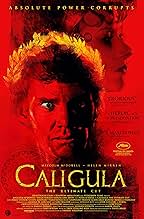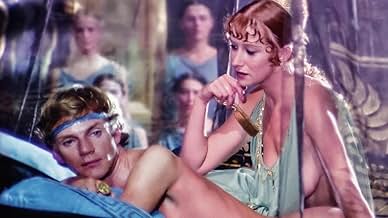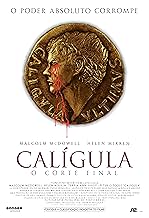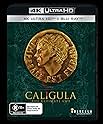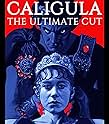NOTE IMDb
6,3/10
1,7 k
MA NOTE
Suivez Caligula alors qu'il tue son grand-père adoptif et prend le contrôle de l'Empire romain décadent, le plongeant dans une spirale de dépravation, de dévastation et de folie.Suivez Caligula alors qu'il tue son grand-père adoptif et prend le contrôle de l'Empire romain décadent, le plongeant dans une spirale de dépravation, de dévastation et de folie.Suivez Caligula alors qu'il tue son grand-père adoptif et prend le contrôle de l'Empire romain décadent, le plongeant dans une spirale de dépravation, de dévastation et de folie.
- Réalisation
- Scénario
- Casting principal
Malcolm McDowell
- Caligula
- (images d'archives)
Helen Mirren
- Caesonia
- (images d'archives)
Teresa Ann Savoy
- Drusilla
- (images d'archives)
Peter O'Toole
- Tiberius
- (images d'archives)
John Gielgud
- Nerva
- (images d'archives)
Guido Mannari
- Macro
- (images d'archives)
Giancarlo Badessi
- Claudius
- (images d'archives)
Bruno Brive
- Gemellus
- (images d'archives)
Adriana Asti
- Ennia
- (images d'archives)
Leopoldo Trieste
- Charicles
- (images d'archives)
Paolo Bonacelli
- Chaerea
- (images d'archives)
John Steiner
- Longinus
- (images d'archives)
Mirella D'Angelo
- Livia
- (images d'archives)
Donato Placido
- Proculus
- (images d'archives)
Osiride Pevarello
- Giant
- (images d'archives)
John Francis Lane
- Major Domo
- (images d'archives)
Eduardo Bergara Leumann
- Bergarius
- (images d'archives)
Andrew Lord Miller
- Senator Acesius
- (images d'archives)
Avis à la une
Let me start by saying that I had recently watched the original for the first time, ending up being shocked how bad it is, as majority of people. It was pointless, too porny, to vague.
However, this one here, shows how much editing is important, especially soundtrack and music in the film. The ambient is there, the plot is there, the arcs of the characters is there. All that while still having a unique and strong artistic form to it. I really enjoyed this movie, and can't point my finger why. However it was 3h of pure captivation and mind stimulation. I really do hope this becomes a trend and re-edits of famous disasters get a new life.
However, this one here, shows how much editing is important, especially soundtrack and music in the film. The ambient is there, the plot is there, the arcs of the characters is there. All that while still having a unique and strong artistic form to it. I really enjoyed this movie, and can't point my finger why. However it was 3h of pure captivation and mind stimulation. I really do hope this becomes a trend and re-edits of famous disasters get a new life.
This is truly a lost opportunity. After a massive search, a film scholar tracked down all of the original film shot by director Tinto Brass, who is still alive, and he wante4d to work with Brass to finally make a director's cut.
Penthouse, which own the rights, changed management and the new management instead turned the footage over to some people with absolutely no background in film restoration. This new team said they wanted to restore the film to the intentions of Gore Vidal's script. The main problem with that is Tinto Brass was not filming Vidal's script as it was written, as he thought it was terrible. He and actor Malcolm McDowell reworked the script into something more of an art film.
The result of this restoration is that the scenes are finally in the right order but put together with with no sense of style or pacing. Tinto Brass envisioned lots of close up and fast editing, and completed about half of the film this way. Instead we get long takes that emphasize the lavish sets and obscure the action. It looks like a rough cut that is waiting for someone to add closeups and quicken the pace. A few individual scenes work much better in the original due to better editing.
Another drawback is the overly modern score, which doesn't reflect musical trends of the 1970s, when the film was shot.
On the plus side, all of the incongruous hardcore scenes shot by Penthouse chief Bob Guccione are gone. A more coherent performance by Malcolm McDowell can be seen, though at times some of the more manic takes might have worked better to emphasize his deteriorating mental state.
Penthouse, which own the rights, changed management and the new management instead turned the footage over to some people with absolutely no background in film restoration. This new team said they wanted to restore the film to the intentions of Gore Vidal's script. The main problem with that is Tinto Brass was not filming Vidal's script as it was written, as he thought it was terrible. He and actor Malcolm McDowell reworked the script into something more of an art film.
The result of this restoration is that the scenes are finally in the right order but put together with with no sense of style or pacing. Tinto Brass envisioned lots of close up and fast editing, and completed about half of the film this way. Instead we get long takes that emphasize the lavish sets and obscure the action. It looks like a rough cut that is waiting for someone to add closeups and quicken the pace. A few individual scenes work much better in the original due to better editing.
Another drawback is the overly modern score, which doesn't reflect musical trends of the 1970s, when the film was shot.
On the plus side, all of the incongruous hardcore scenes shot by Penthouse chief Bob Guccione are gone. A more coherent performance by Malcolm McDowell can be seen, though at times some of the more manic takes might have worked better to emphasize his deteriorating mental state.
Caligula is a film with a storied history. What began as a sprawling historical epic saw much of the film land on the cutting room floor. In its place, a violent and pornographic cash-grab that bore little resemblance to the script by Gore Vidal. Though a box office success, thanks to the controversy surrounding the film, critics derided it, and the cast disowned it. Now, forty-four years later, Caligula: The Ultimate Cut intends to showcase the film's original vision-a riveting and complex historical drama showcasing the intoxicating allure of sexuality and power. The film runs nearly three hours, is entirely fascinating, and delivers a triumphant expose on how 'absolute power corrupts absolutely.' In an era of director's cuts and alternate versions, Caligula is a magnificent restoration with a triumphant zeal.
Full Review: Geek Vibes Nation.
Full Review: Geek Vibes Nation.
Having looked at the laserdisc R-rated version, the "Imperial" unrated version and the documentary promotional short featuring Guccione and Vidal attempting to explain, I find it very hard to see the "Ultimate Cut" as the new movie it is supposed to be. It does indeed appear to be made of elements previously unseen. This was never a terrible, but an unfortunate movie, born crippled over and over. We may never see the 4 hour masterpiece that (perhaps) could have been. In this version there is much to like, much beauty and humor. Maybe not the best takes, or camera angles, but more story. The whole thing makes more sense. Not subtle, but fun. Happily the actors have loads more screen time. Teresa Ann Savoy isn't just pretty and likable. As Caligula's calculating, patient, loving sister, she helps so much! If you have ever dreamed of being a movie editor because it looks easy, this movie and its difficulties will enhance your respect for the editor's art. Enjoy it some time when the children and the easily offended are not around.
This is a superb work of film forensics, creating a version of the film with the narrative cohesion that the original release sorely lacked. Cutting all the gratuitous porn plays a major part in giving the film that narrative cohesion and allows Gore Vidal's political themes to take centrestage. The performances truly shine, with original actors' vocal performances restored instead of the over-dubs used for some characters- especially good for Teresa Ann Savoy. Helen Mirren is given considerably more screentime, which is very welcome, and Malcolm McDowell's performance is revealed as the Oscar-worthy performance we deserved to see in 1980. The new music is also a huge improvement on the 'found' score of 1980.
However there are three exclusions that I didn't like. One was the death of Proculus, which gave some closure to the unforgettable marriage violation scene - and is an extraordinary scene in itself. I think it could have remained without the gratuitous bit with the naked ladies. The second was the scene with Ennia on the bed being 'serviced' by her male companions- it was not entirely clear what service they were providing! A re-edit could make this clearer without becoming porn. The most seriously disappointing ommission for me though was the conclusion of John Gielgud's performance - when Nerva and Caligula share a powerful moment. Given this edit's aim of enhancing the performances, it seems very strange to rob Gielgud of any screetime, given how brief his role is. Perhaps the restorers thought this moment made Caligula look too mad too early but I think it's a vital moment for both characters, and is reflected later in the aforementioned, also cut, Proculus scene. For an 'ultimate' cut I think this scene needs to go back.
In any case I think this is an amazing feat of restoration bringing this extraordinary film much closer to the one Tinto Brass and Gore Vidal intended it to be.
However there are three exclusions that I didn't like. One was the death of Proculus, which gave some closure to the unforgettable marriage violation scene - and is an extraordinary scene in itself. I think it could have remained without the gratuitous bit with the naked ladies. The second was the scene with Ennia on the bed being 'serviced' by her male companions- it was not entirely clear what service they were providing! A re-edit could make this clearer without becoming porn. The most seriously disappointing ommission for me though was the conclusion of John Gielgud's performance - when Nerva and Caligula share a powerful moment. Given this edit's aim of enhancing the performances, it seems very strange to rob Gielgud of any screetime, given how brief his role is. Perhaps the restorers thought this moment made Caligula look too mad too early but I think it's a vital moment for both characters, and is reflected later in the aforementioned, also cut, Proculus scene. For an 'ultimate' cut I think this scene needs to go back.
In any case I think this is an amazing feat of restoration bringing this extraordinary film much closer to the one Tinto Brass and Gore Vidal intended it to be.
Le saviez-vous
- AnecdotesThe film is a complete re-imagination of Caligula (1979), based on 96 hours of never-before-seen footage recovered many years after its release. Under the supervision of historian Thomas Negovan, an "Ultimate Cut" of the film was created. Instead of expanding existing scenes with the new footage, the entire film was edited from scratch, which resulted in a version that doesn't contain a single frame from the theatrical version. Visual effects were used to enhance scenes and replace cheap sets and backgrounds, and AI technology was used to restore previously unusable dialogue that was plagued with background noises. A new music score was composed as well, in contrast to the public domain ballet music. A limited theatrical release was planned in late 2020, but it was delayed due to legal difficulties, distribution issues and the Covid-19 pandemic. This version eventually premiered at the Cannes Film Festival in 2023, with high remarks by actors Malcolm McDowell (who previously had been ashamed by the film) and Dame Helen Mirren.
- ConnexionsEdited from Caligula (1979)
Meilleurs choix
Connectez-vous pour évaluer et suivre la liste de favoris afin de recevoir des recommandations personnalisées
Détails
Box-office
- Montant brut aux États-Unis et au Canada
- 76 031 $US
- Week-end de sortie aux États-Unis et au Canada
- 30 815 $US
- 18 août 2024
- Montant brut mondial
- 93 048 $US
Contribuer à cette page
Suggérer une modification ou ajouter du contenu manquant

Lacune principale
What is the Canadian French language plot outline for Caligula: The Ultimate Cut (2023)?
Répondre

